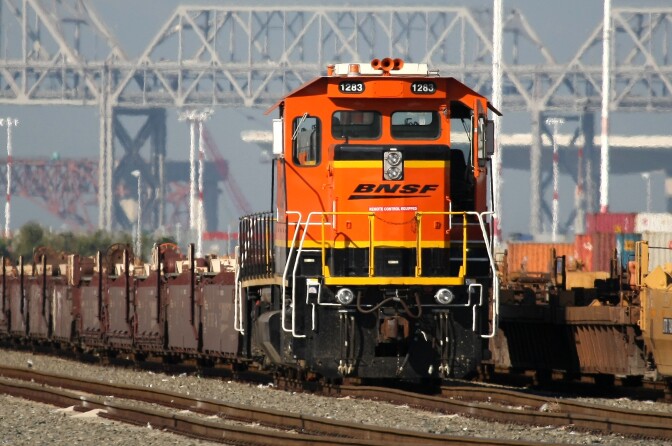This story is free to read because readers choose to support LAist. If you find value in independent local reporting, make a donation to power our newsroom today.
This archival content was originally written for and published on KPCC.org. Keep in mind that links and images may no longer work — and references may be outdated.
Railroads fined for not reporting dirty diesel trucks at SoCal rail yards

Ports have been working to reduce fumes from diesel trucks, but local rail yards have remained a hot spot for diesel air pollution. To help remedy that, the California Air Resources Board (CARB) announced a combined $1.25 million in fines this week against two railroads that let dirty diesel trucks enter their rail yards.
The fines are for violations of the state’s Drayage Truck Regulations, which require trucks that haul cargo to rail yards to meet strict diesel emission standards. Trucks that don’t are supposed to be reported to the state Air Resources Board. At local ports, such trucks are also turned away from the gates.
But for several years, two railroads failed to correctly report information on all the dirty diesel rigs arriving at their rail yards in Los Angeles, Commerce, Industry and San Bernardino. The railroads filed reports, but they were often missing critical information like accurate vehicle identification numbers, said Todd Sax, chief enforcement officer for the board.
“If we don't have the vehicle identification number we don't have sufficient information to move the case forward against the fleet,” Sax said.
Union Pacific Railroad Company will pay $525,000 into a state air pollution control fund for three years of violations and has pledged to adopt a turnaway policy.
Union Pacific spokesman Justin Jacobs said in an emailed statement, “At our facilities, we will turn away trucks that are not compliant with current CARB standards and regulations.”
Burlington Northern Santa Fe (BNSF) agreed to pay $720,000 in penalties for six years of reporting violations. Of that, $625,000 will go for air filtration systems to be installed under supervision of the South Coast Air Quality Management District at schools near rail yards
BNSF spokeswoman Lena Kent said in an emailed statement that the company “worked collaboratively with the California Air Resources Board (CARB) for nearly 20 years to reduce emissions and improve air quality. To that end, we are pleased to resolve a recent issue with CARB to our mutual satisfaction.”
BNSF has not adopted a turnaway policy, Sax said, preferring instead to focus on the reporting requirements.
Neither company would respond to questions about why their rail yards failed to report accurate or complete VIN numbers to the board.








